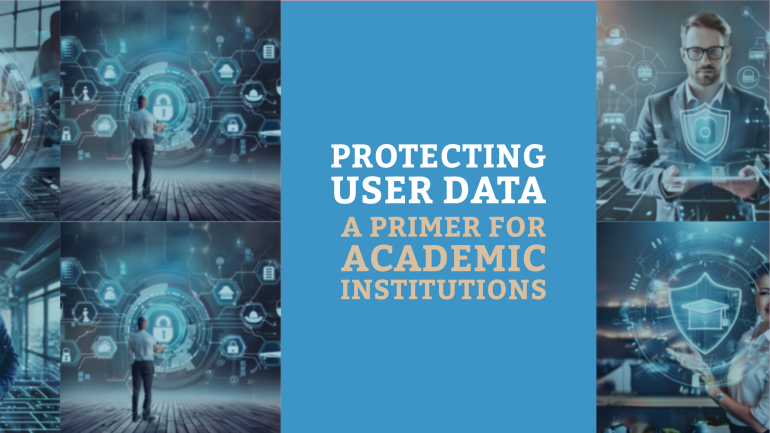Table of Contents
TL;DR: Protecting User Data – A Primer for Academic Institutions
- Understanding data protection laws: Academic institutions must be aware of data protection laws such as the Family Educational Rights and Privacy Act (FERPA) and the General Data Protection Regulation (GDPR) to ensure compliance and protection of user data.
- Implementing security measures: It is crucial for academic institutions to implement strong security measures such as encryption, multi-factor authentication, and regular security audits to safeguard user data from cyber threats.
- Creating data privacy policies: Academic institutions should develop clear and comprehensive data privacy policies that outline how user data is collected, stored, and used, as well as provide guidelines for data access and sharing.
- Training staff and students: Educating staff and students on data protection best practices, privacy policies, and security measures is imperative to create a culture of data protection within academic institutions.
- Collaborating with cybersecurity experts: Academic institutions should consider collaborating with cybersecurity experts or consultants to assess their data protection practices, identify vulnerabilities, and implement effective security measures to protect user data.
Security in academic institutions is paramount to protect sensitive user data from cyber threats and unauthorized access. With the increasing reliance on digital platforms for education, it is crucial for universities and colleges to implement robust data protection measures to safeguard the personal information of students, faculty, and staff. This blog post will provide an overview of the key security best practices that academic institutions should follow to secure their user data and maintain trust in the digital age.
Understanding User Data in Academic Institutions
Types of user data held by academic institutions
Some academic institutions hold various types of user data to support their academic functions. This data includes personal information such as student and staff records, financial data, research findings, and intellectual property. Academic institutions also collect data from online interactions, including email communications, learning management systems, and research collaboration platforms. After collecting this data, it is crucial for institutions to ensure its protection and confidentiality.
| User Records | Financial Information |
| Research Data | Intellectual Property |
| Online Interactions | Collaboration Platforms |
Potential risks and threats to user data
To effectively protect user data, academic institutions must be aware of the potential risks and threats it faces. Risks include unauthorized access to sensitive information, data breaches, phishing attacks, and ransomware incidents. Cybercriminals target academic institutions due to the valuable research data and personal information they hold. It is imperative for institutions to implement robust cybersecurity measures and regular training programs to mitigate these risks and safeguard user data.
Developing a Data Protection Strategy
Key principles of data protection
There’s a fundamental necessity for academic institutions to adhere to key principles of data protection to ensure the confidentiality and integrity of user data. Principles such as data minimization, purpose limitation, and accountability are crucial in maintaining the trust of students, faculty, and stakeholders.
Steps for implementing a robust data protection plan
Robust data protection plans are important to safeguard sensitive information within academic institutions. Implementing encryption protocols, conducting regular security audits, providing staff training on data handling best practices, are vital steps to fortify the data protection framework.
To ensure the efficacy of the data protection plan, academic institutions should conduct regular risk assessments to identify vulnerabilities, establish clear incident response protocols in case of a breach, and stay updated on data protection regulations and best practices. By taking proactive measures and staying vigilant, institutions can mitigate the risks associated with data breaches and uphold the privacy rights of their users.
Legal and Ethical Considerations
Understanding compliance with data protection laws
For academic institutions, the protection of user data is a paramount concern. Understanding and complying with data protection laws such as the General Data Protection Regulation (GDPR) and the Family Educational Rights and Privacy Act (FERPA) is important to avoid legal repercussions. Institutions must ensure that they have processes in place to secure sensitive information and obtain necessary consent for data collection and storage.
Ethical usage of student and faculty personal information
To maintain trust and respect within the academic community, it is crucial for institutions to ethically handle student and faculty personal information. This includes obtaining consent before collecting data, using information only for its intended purpose, and ensuring that data is securely stored and only accessible to authorized personnel. Institutions must also educate their staff on ethical data practices to prevent misuse or unauthorized access.
Another critical aspect of ethical data usage is the transparent communication of how personal information will be utilized. Clear privacy policies and consent forms should be provided to students and faculty members, outlining what data will be collected, how it will be used, and who will have access to it. Transparency and accountability are key to maintaining the integrity of academic institutions and protecting the privacy of individuals.
Tools and Best Practices for Data Security
Technological solutions for safeguarding user data
After implementing data encryption, institutions can also use secure multi-factor authentication, which requires additional verification beyond a password to access systems. Regular data backup and secure offsite storage are crucial to protect against data loss due to breaches or system failures. Utilizing advanced firewall protection and intrusion detection systems can also help in preventing unauthorized access to sensitive information.
Organizational protocols to ensure data privacy
Tools like access controls and user permissions can limit who can view or modify data, ensuring that only authorized individuals have access. Regular security audits and assessments can identify vulnerabilities that need to be addressed promptly. Establishing clear data handling policies and training staff on data security best practices are integral in maintaining a secure environment.
Another vital aspect of organizational protocols is incident response planning, which outlines the steps to be taken in case of a data breach. This plan should include procedures for containing the breach, investigating the cause, and notifying affected parties and regulatory authorities. Regularly updating security protocols based on new threats and technologies is crucial to stay ahead of potential risks.
Response and Remediation
Procedures for handling data breaches
Many academic institutions may face the unfortunate reality of experiencing a data breach. With the sensitive nature of the information they hold, it is crucial to have clear procedures in place for responding to such incidents swiftly and effectively. This includes identifying the breach, containing the damage, mitigating risks, and notifying the appropriate parties.
Importance of data recovery and contingency planning
Procedures and guidelines for data recovery and contingency planning are vital components in protecting user data in academic institutions. Response plays a vital role in ensuring that any lost or compromised data can be recovered promptly with minimal disruption. It also involves developing comprehensive plans for backup systems, disaster recovery, and continuity of operations.
Educating Stakeholders and Fostering a Culture of Security
Training programs for staff and students
Not implementing comprehensive training programs for staff and students can leave academic institutions vulnerable to data breaches and cyber threats. It is important to provide regular workshops and sessions on data security protocols, password management, and phishing awareness to ensure that everyone understands their role in protecting sensitive information.
Building awareness and accountability at all levels
Any academic institution serious about safeguarding user data must create a culture of security at all levels. This involves promoting awareness about the importance of data privacy, fostering a sense of responsibility towards protecting information, and holding individuals accountable for any lapses in security measures.
For instance, conducting regular security audits and assessments can help identify weaknesses in the system and address them promptly. Creating clear policies and guidelines on data handling and regularly updating them can also enhance awareness and accountability among stakeholders.
To wrap up
Following this primer on protecting user data in academic institutions, it is clear that safeguarding sensitive information is paramount. By implementing robust security measures, educating all stakeholders about best practices, and staying abreast of emerging threats, institutions can effectively mitigate risks and ensure data integrity. It is crucial for academic institutions to prioritize data protection to uphold their reputation, maintain trust with stakeholders, and comply with regulations. By fostering a culture of data security and continuously refining protocols, institutions can establish a strong foundation for safeguarding user data in an increasingly digital landscape.
FAQ
Q: Why is protecting user data important for academic institutions?
A: Protecting user data is crucial for academic institutions to maintain trust, confidentiality, and compliance with data protection laws. It ensures the security and privacy of sensitive information belonging to students, faculty, and staff.
Q: What are some common threats to user data in academic institutions?
A: Common threats to user data in academic institutions include data breaches, phishing attacks, malware infections, unauthorized access to systems, and social engineering tactics. These threats can lead to identity theft, financial loss, and reputational damage.
Q: How can academic institutions protect user data effectively?
A: Academic institutions can protect user data effectively by implementing strong security measures such as data encryption, multi-factor authentication, regular security audits, employee training on data protection best practices, and establishing clear data protection policies.
Q: What should academic institutions do in case of a data breach?
A: In case of a data breach, academic institutions should act swiftly by containing the breach, assessing the impact, notifying affected parties, cooperating with relevant authorities, conducting a thorough investigation to identify the cause, and implementing measures to prevent future breaches.
Q: How can academic institutions ensure compliance with data protection laws?
A: Academic institutions can ensure compliance with data protection laws by staying informed about relevant regulations, appointing a data protection officer, conducting regular compliance assessments, obtaining consent for data processing activities, and maintaining detailed records of data processing activities.





